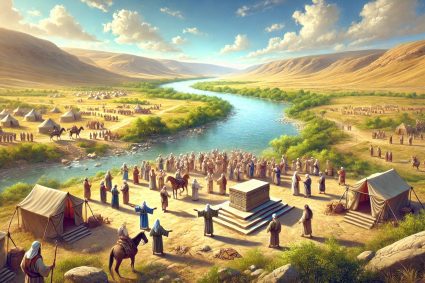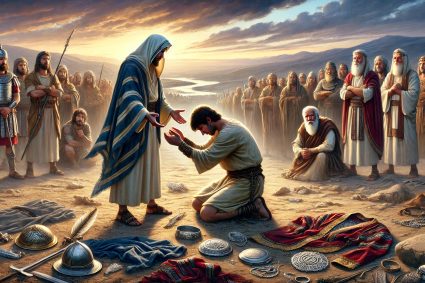
Series EXODUS with Pastor Mark Finley
Lesson 1.Oppression: The Background and the Birth of Moses
From Blessing to Slavery: God at Work in Difficult Times
The first lesson takes us to the beginning of the book of Exodus, where we witness Israel’s transition from a time of great blessing to the harsh reality of oppression. What began with rescue through Joseph ends under a new Pharaoh in fear, suffering, and slavery. Yet even in this dark time, God’s presence remains evident—through courageous individuals like the midwives and His unseen guidance. The birth of Moses marks the beginning of a great plan of deliverance, even though the circumstances appear hopeless. This lesson reminds us that God is still at work, even when we don’t immediately perceive Him. His plan continues—despite the shadow of oppression.
1.1 God’s People in Egypt
From Blessing to Oppression: God’s People Under Foreign Rule
The book of Exodus begins with a reflection on God’s blessing over the descendants of Jacob, who greatly multiplied in Egypt. But this blessing was soon overshadowed by a new political regime—a king who didn’t know Joseph and felt threatened, leading to the oppression of the people. This turn of events reminds us that favorable circumstances are never guaranteed and should not be taken for granted. Despite severe oppression, the people continued to grow—a sign of God’s abiding presence and faithfulness. The story shows that God works even through suffering and fulfills His promises—even amid human injustice. The beginning of Exodus is a testimony that God’s plan is greater than human schemes.
1.2 The Historical Background
God’s Faithfulness in History: From Joseph’s Rise to Israel’s Oppression
Israel’s story in Egypt begins with God’s guidance and Joseph’s remarkable rise, which ultimately saved many lives. But with the change in Egypt’s leadership, the situation turned, and God’s people fell under heavy oppression. Despite changing political circumstances, one thing remained constant: God’s work behind the scenes. He never forgot His people, not even in times of slavery and hardship. The historical developments show that God continues to act even through political and social upheaval. The story reminds us that God’s plan moves forward faithfully—even through human power struggles.
1.3 The Hebrew Midwives
Courage for Truth: Faithful Women Against the King’s Decree
The two midwives, Shiphrah and Puah, represent quiet but powerful resistance against injustice. Although they disobeyed the command of the powerful Pharaoh, they acted out of reverence for God and saved many children from death. Their names are remembered to this day, while the Pharaoh’s name is forgotten—a sign of whom God honors. In a time of darkness, they were bearers of light through their determination to do what was right. Their example teaches us that true courage means fearing God more than people. Even simple acts of faith can have lasting consequences—for history and for the kingdom of God.
1.4 Moses Is Born
A Child of Hope: God’s Plan Begins in Secret
The birth of Moses occurred under life-threatening circumstances, yet God’s providence and protection were clearly evident. Not only was Moses saved, but he was also taken in and raised by the household of the enemy—a divine act of irony and grace. His mother was allowed to nurse and influence him, even though he officially belonged to the Egyptian princess. The term tov (“good”) reveals that God had great plans for him—even in seemingly hopeless conditions. Moses is a sign that God prepares a deliverer in the midst of chaos. His story reminds us that God’s plans often begin in secret—but they never fail.
1.5 A Change of Plan
When Plans Fail: God’s Way Often Begins Where Ours Ends
Moses’ killing of the Egyptian suddenly changed the course of his life—from heir to the throne to fugitive. Though his action wasn’t God’s will, the story shows that God can use even our failures to fulfill His greater purpose. In the wilderness of Midian, Moses wasn’t discarded but shaped—far from Egypt’s splendor and closer to God’s presence. The former prince had to learn humility and dependence before becoming an instrument of deliverance. God’s ways are not our ways, yet they are good and purposeful. Romans 8:28 reminds us: Even detours and failures can be part of His greater plan.
1.6 Summary
God’s Plan in the Shadow of Oppression
Lesson 1 traces Israel’s journey from a blessed settlement in Egypt to brutal enslavement under a new Pharaoh. Despite harsh oppression, the people continued to grow—a sign of God’s ongoing faithfulness. In the midst of suffering, courageous women like the Hebrew midwives resisted evil and saved lives. The birth of Moses—a “good” child—occurred under threat of death, yet God’s protection and providence were clearly at work. Moses was raised in the house of the enemy but fled to Midian after a fateful mistake, where God continued to prepare him. This lesson shows: Even in darkness and upheaval, God’s plan remains alive—and He prepares deliverers long before we recognize them.
(Visited 6 times, 1 visits today)




















